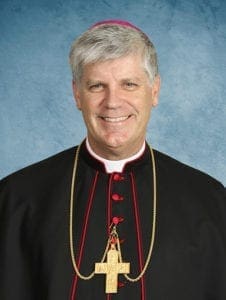Is there hope within the young?
By BISHOP BERNARD E. SHLESINGER III | Published November 17, 2023 | En Español
Last month, I went to the Catholic Center at the University of Georgia (UGA) to celebrate the Eucharist and participate that evening in a session of questions and answers with the students. Although these young Catholics were ready to ask me questions about the church, her teaching and how to live one’s Catholic faith, we began the session by me posing a question to them: “Do you as young Catholics have hope for the future?”

Bishop Bernard E. Shlesinger III
I was interested in hearing their responses since many of their contemporaries who were raised Catholic are now searching for meaning and purpose outside of religious institutions. I learned three things about this group of young people that you as the reader may find encouraging.
First, these UGA students did not talk about their hope being related to a temporal future as if their happiness was dependent on the world changing. One person expressed concern that her generation might appear rather pessimistic than optimistic toward the future. Several students spoke of a hope that was not situational but more relational and the importance of gathering to strengthen their hope in Christ. Hope for them was not limited to achieving success but more centered on the essential relationship with Jesus. Listening to them, I sensed that the Lord was leading them rather than them struggling to find their way in the world.
Second, I was pleasantly surprised these young Catholics—numbering between 50 and 75 students—were open to sharing their faith and talk about their lived experiences. They were accepting of one another in charity and felt it imperative to share their joys, anxieties and fears in the context of faith. They showed a strong commitment to growing in understanding how “those who accept Jesus’ offer of salvation are set free from sin, sorrow, inner emptiness and loneliness.” These students could speak about making time to spend with the real presence of the Lord in the Eucharist and how they wanted to promote eucharistic adoration.
Third, I learned that for some present, there was an anxiety relating to leaving college and entering the secular working world. Those who were finishing their last year of college were a bit anxious about whether they could connect with other young adults after graduating from college and find a faith support network. When asked about how I discerned my vocation to becoming a priest, I acknowledge with gratitude how impactful it was for me to have found a young adult group and to have been invited to participate in a weekly Cursillo group reunion.
Toward the end of the Q & A gathering, one of the students asked me: “What hope do I have as a bishop for us in the future?” My response was that I hope they would continue to encounter in Jesus the one friend who will never disappoint them, and that the church would never allow them to feel alone and unsupported.
As I left the UGA Catholic Center, I was overjoyed in having experienced that there is hope within the young, and I thanked the students for sharing theirs with me.